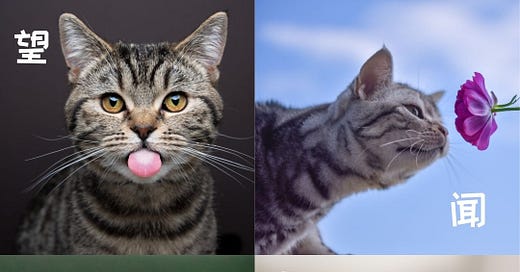I remember that when I was sick as a child, our family doctor would come over to visit me and that he would ask me to show my tongue and tells to say eeee. Then, with his stethoscope on my lungs, he would ask me to say 33 (I know, I know…it seems that in English you would rather say 99! But in Italy it’s 33). At that point he would continue the conversation with my mother, who would duly report about my stools or my catarrh, among other things.
I don’t think I have been asked to do any of these since childhood and I have the impression that nowadays doctors rely much more on exams performed by machine rather than these “old fashioned” diagnostic tools.
If you are a nostalgic of the old school, you may like a visit to a TCM doctor.
Nowadays there are synergies with the allopathic medicine and a TCM doctor might recommend a patient to get a scan or a blood test and use the results to calibrate its diagnosis or treatment. But the diagnostic tools of a TCM doctor do not rely on machine; instead, they depend on what a doctor sees, hears, smells and palpate.
Welcome to this post about TCM diagnostic tools!
They are four:
Observation – Wàng – 望
Hearing and smell – Wén - 闻
Interrogation – Wèn –问
Palpation – Qiè – 切
They are all relevant for a diagnosis, but some methods are particularly important: the tongue and the pulse, included respectively in the observation and in the palpation. I will dedicate two separate posts to these two specific diagnostic techniques, besides explaining a little of all 4.
According to TCM this diagnostic system works by virtue of two principles:
· The exterior mirrors the interior
· The whole reflects the part
Looking at the external, for example the skin, the hair, the tongue and on so, it is possible to identify the nature of the illness: cold or hot, superficial or internal, excess or deficient, Yin or Yang.
At the same time TCM affirms that there is interdependence between the different parts of the body. Thus, each organ has its sphere of influence and observing one single part can deliver information about the whole. For example, the pulse or the tongue can give information about the whole body. Or the hearing, which belongs to the sphere of the Kidneys, can tell something about the state of the Kidneys.
Chinese medicine has developed over thousands of years and is based on the experience of countless doctors, who have honed their ability to observe not only the body but also the gestures, voices, and color of patients and to correlate these aspects with certain pathologies.
In Italy we have the curious the idiom “non farti il fegato amaro”, which literally translates in “don't make your liver bitter”. It is used to refer to someone who is very angry but does not express the anger. It was believed that fits of anger cause the bile, a bitter liquid produced by the liver, to reach the blood. Well, guess what? In TCM the Liver is associated with the bitter taste, and when a patient complains of having bitter in month, it is a sign that the patient’s Liver-Qi might be blocked.
This says a lot about the fact that popular wisdom often has a basis of truth, which knows no boundaries.
Disclaimer: everything I write about TCM is to share some knowledge and to raise awareness but please be aware that it is an oversimplification for the sake of communication, and it is not meant as a cure. If you have any health issue you want to solve with TCM, please consult a TCM practitioner. While most qigong exercises are harmless no matter the health issue, some food recipes or treatment I will mention, might have the opposite effect if you do not have the syndrome I write about. Thus, please take my TCM posts with a grain of salt and do not rush to do things without consulting a TCM doctor





